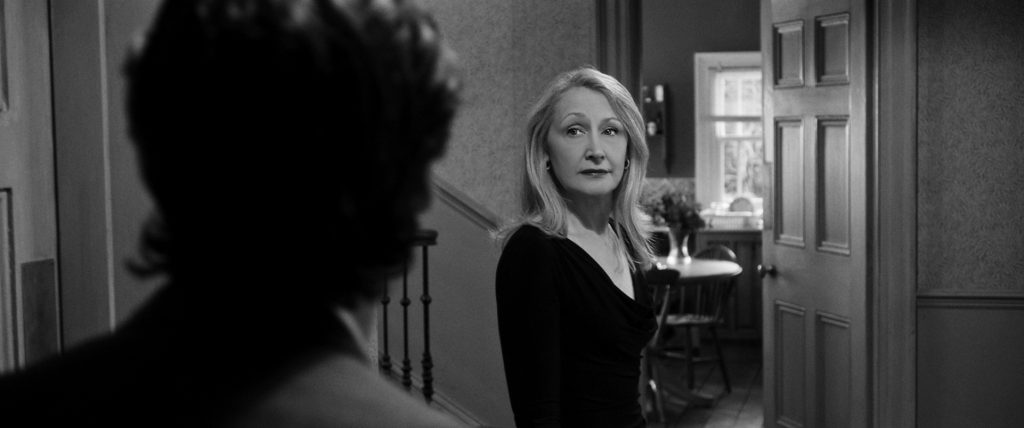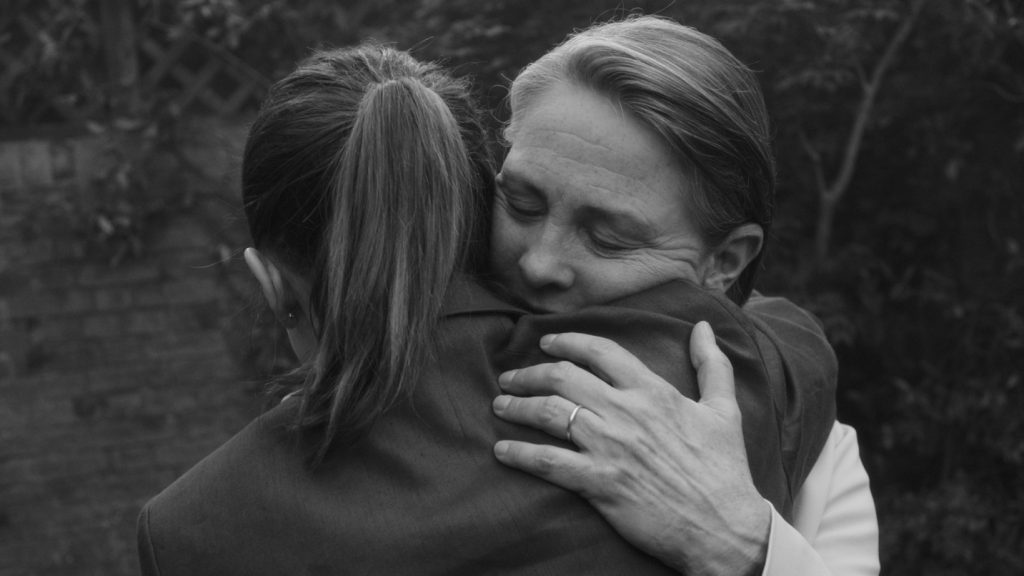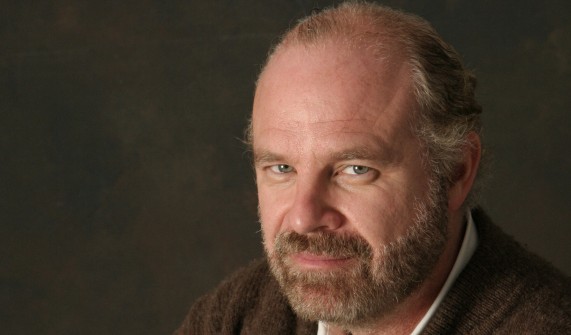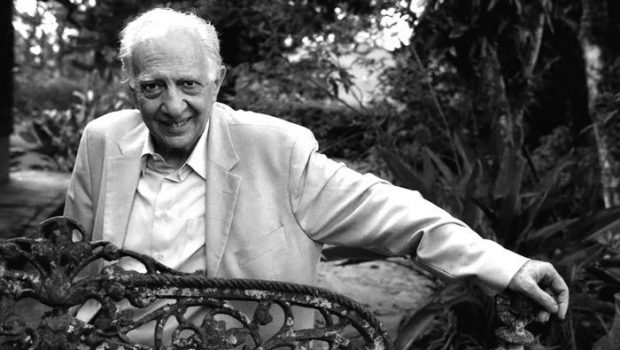Leaving the Party
So Mayer
Hillary Rodham Clinton’s presidential campaign memoir is currently the 5th bestselling title on Amazon US. Its title, What Happened?, could also be given to Sally Potter’s thrilling new film The Party, which ends with an older female character, distraught, opening the front door of a house, and pointing a gun towards the camera. The film then winds back an hour: Janet, played by Kristin Scott Thomas, is revealed to be a career politician in the UK’s opposition party (Labour by implication, although it’s never mentioned) who has just been appointed shadow health secretary. Like Clinton, Janet believes in universal healthcare and other principles (if not practices) of liberal social justice such as non-violence, and truth and reconciliation. And she has Hillary hair.
It’s her best friend April (Patricia Clarkson) who breaks it to her: “I adore you, Janet, but…” she says, and then tells her she has to change her hair–to break the stereotype of the modern female politician’s necessarily assertive-yet-non-threatening, mid-length crop. It’s a key moment in a film that revolves around revelations: you suspect April has something far worse to confess, but in fact, her forthright comment on Janet’s hair wittily encapsulates the “damned if you do, damned if you don’t” problem for women in the eye of the media. Whatever they do, they face a barrage of comments on their looks–even, it seems, from their oldest, most feminist friends.
The mirroring between Clinton and Janet isn’t just co-incidence: Potter has long been a filmmaker attuned to broad political currents, and particularly to the history of feminism’s strange and sinuous relationship with the political mainstream. In her first feature, The Gold Diggers, she drew connections between colonial and imperial attitudes to land and resources, and patriarchal attitudes to women’s bodies, investigating circuits of ownership that made women, gold, land and the image all substitutes for each other in never-ending consumption, symbolized strikingly by Ruby (cinematic icon and political activist Julie Christie) being carried to the bank in a gilded cage. And, in her 1992 film adaptation, she altered the ending of Virginia Woolf’s novel Orlando so that the protagonist Orlando (played by Tilda Swinton), having changed from male to female, does not get to inherit the Great House by bearing a son, but instead has a daughter and gives up her aristocratic title and property ownership.

©Adventure Pictures Ltd
So although Janet, with her deep commitment to the many, not the few (to borrow the slogan of current British Labour leader, Jeremy Corbyn), is the protagonist of Potter’s film, she’s not exactly its hero. “You’re lost, aren’t you, Janet?” asks April, a little after their discussion of hair; caught in the system, April could have added. Janet’s decisions – like Clinton’s–come under scrutiny as her husband Bill (Timothy Spall), a distinguished academic, makes a series of startling pronouncements, concerning his health, his relationship to Janet, and his resentment at her success. April is not the only witness: this is a party thrown to celebrate Janet’s promotion, which is now cast into doubt. April’s boyfriend Gottfried (Bruno Ganz) is on hand to offer New Age clichés, while Bill’s old friend Martha (Cherry Jones) defends her colleague and college roommate–only to invite relationship difficulties of her own with her wife Ginny (Emily Mortimer). And Tom (Cillian Murphy), husband to the absent Marianne, one of Janet’s colleagues, has reason to confront Bill, and indeed intends to do so, violently.
These smart people talk fast and furious, in a script that rivals Aaron Sorkin for political and psychological insight, whipped up by Alexei Rodionov’s cinematography and Potter’s stellar soundtrack choices into a zinging, stinging farce. Potter shot the film in mid-2016, at the height of the campaigning around the UK’s referendum on leaving the European Union and the US election, and watching it, you feel that the current political situation has met the genre it deserves. There’s hors d’oeuvres on fire in the kitchen and a smoke alarm going off, and all of the older characters are too introspective and self-obsessed to care–Ginny, heavily pregnant and a chef, ends up taking care of the situation while Tom, who she commandeers to help her, proves totally ineffectual.
It’s no accident that Ginny, the young, queer woman with the most taxing, physical job and embodiment, who is on the front line of the politics of labour both economic and reproductive, is the most practically and emotionally capable. Shocked by Martha’s cavalier attitude towards Bill and Janet’s relationship, Ginny demands–and receives–a sincere commitment from her wife, reversing the expectation you might have of a couple whose names invoke Edward Albee’s Who’s Afraid of Virginia Woolf? This scene of, exactly, truth and reconciliation (the only one in the film) takes place outside the elegant house that at first seems so graceful and welcoming, like Janet herself, but comes to feel like a trap, a circle of hell for the chattering classes. Ginny steps outside, and Martha follows, and in the garden where foxes roam, they find each other again.
That bigger outdoor world beyond the confines of the house is always a highly significant space in Potter’s films–Ruby’s memories of her childhood home’s garden; Orlando’s maze; or the movement of She (Joan Allen) in Yes from her whited sepulcher of a townhouse to running along the Malécon in Havana. For Potter’s female protagonists, in particular, getting outside is a vivid liberation; it’s not a simplistic woman=nature equation, but an ecstatic, yearned-for reconnection with the potential to be larger than domestic space, more various, more honest, and more alive.
Two days after the 2016 US election, news outlets reported the first post-concession sighting of Hillary Clinton: Margot Gerster, who lives in upstate New York, had been out hiking (with her child on her back in a baby carrier) in the woods of Westchester County, and bumped into the 67th Secretary of State taking a similar walk through the fallen leaves. Even once What Happened is published, we won’t know if Clinton was tempted – as Janet is at the end of the film – to respond to the collapse of her ideals with violence (some would say that Clinton’s hawkishness is evidence that, at least politically, she did choose violence); equally, at the end of Potter’s film, we don’t know what will happen to Janet.

©Adventure Pictures Ltd
The film’s opening shot (which is repeated at its close) is accompanied by Fred Frith’s electric and eclectic guitar interpretation of Hubert Parry’s setting of William Blake’s “And did these feet in ancient times,” with its closing invocation to build “Jerusalem / In England’s green and pleasant land.” Potter, of course, is knowingly setting up Jerusalem as a vexed – by colonialism, both papal and British, as well as Zionism – name for that utopian goal, one that will echo throughout the film’s criticism of Bill’s scholarship on the Roman empire, and the very visible whiteness of all the performers. It’s also a stark reminder that “green and pleasant” nature is always politicized and never innocent; and perhaps too that the project of the left is never over, because–given infighting, desire and other complexities of human nature–utopia will never be built. What’s important, says Potter’s film through its biting satire and pin-sharp observation, is to keep asking what happened? How did we get here? And how do we do what Janet can’t (but Ginny can): step outside ourselves, our entrapping anxieties about property and propriety, and find a way to declare our shared vulnerability, and find–if only for a moment–peace?
Cover image by Brett Weinstein
 So Mayer is the author of Political Animals: The New Feminist Cinema, The Cinema of Sally Potter: A Politics of Love, and the co-editor of Catechism: Poems For Pussy Riot, The Personal Is Political: Feminism and Documentary and There She Goes: Feminist Filmmaking and Beyond. Her Twitter is @tr0ublemayer.
So Mayer is the author of Political Animals: The New Feminist Cinema, The Cinema of Sally Potter: A Politics of Love, and the co-editor of Catechism: Poems For Pussy Riot, The Personal Is Political: Feminism and Documentary and There She Goes: Feminist Filmmaking and Beyond. Her Twitter is @tr0ublemayer.
©Literal Publishing
Posted: September 17, 2017 at 4:13 pm










